- February 28, 2025
- Posted by: Shane Daly
- Category: Trading Article
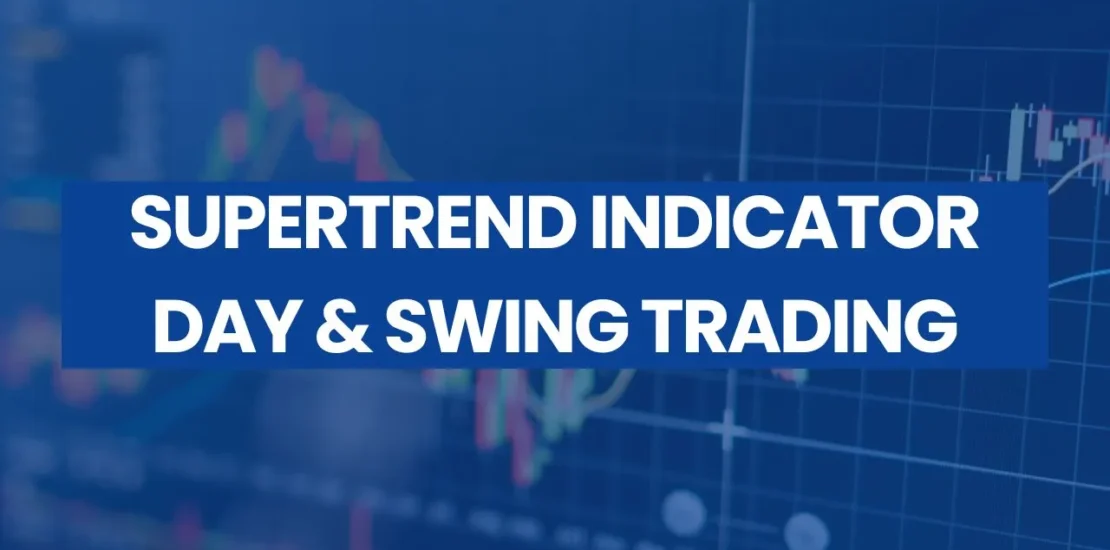
The Supertrend indicator is a good tool for traders seeking clarity in market direction. This versatile technical indicator combines price action and volatility to generate clear buy and sell signals, making it valuable for both beginners and experienced traders. While its basic function are straightforward, mastering the Supertrend’s nuances can turn an average trading strategy into a consistently profitable approach.
The key lies in understanding its core mechanics and implementation methods.
What Is The Supertrend Indicator?
This powerful trend-following indicator will overlay on your chart like a moving average, and provide actionable buy and sell signals or the current trend direction.

How Does Supertrend Indicator Work?
The Supertrend indicator uses a measure called the ‘average true range’ (ATR) to give precise signals. ATR helps understand how much the price of a stock typically moves. This means that you can customize it to account for volatile markets by adjusting the multiplier setting.
After that, you monitor the line on your chart. When the closing prices of stocks end up on the other side of our indicator line, it signals a change in the market trend. When it turns red, it indicates a bearish trend and green indicates a bullish one.
How Reliable is Supertrend?
The indicator gives you an objective trend direction which is dependent on the setting you use. As long as a trader knows the limitations of using any technical tool, the reliability will be determined by how you execute your trading strategy.
Here are the key points for Stocks and Options traders to know:
- The changing colors of the Supertrend line determine the trend direction
- Buy signals are generated when the line flips to green due to closing prices being above the line
- A sell signal occurs when the price closes on the opposite side of the line – the crossover point
- The reliability of the Supertrend depends on how well a trader executes their trading strategy.
Regarding accuracy in identifying market direction, few indicators are more reliable than the Supertrend indicator.
It has been proven time and again that its volatility-based approach allows traders to make predictions with high levels of confidence even in highly volatile markets.
What Are The Settings For The Supertrend Indicator?
When using the Supertrend indicator, you can adjust its parameters to suit your trading style. Changing the period setting, which is used for the ATR calculation, changes how much past data the indicator will use. A setting of 20 on a daily chart will use the past 20 days’ closing prices.
The ‘factor’ is a number we multiply with the ATR value. For example, if the average price movement over the past 20 days is $3, and we set the factor to 2, our indicator will create bands $6 away from the current price. If prices move that much against the indicator and close above or below it, the indicator will change color.
The Supertrend indicator calculation is fundamental. It’s just the average of X period and an average true range calculation from that.
Best Supertrend Indicator Settings For Swing Trading
The standard settings for the indicator are a ‘period’ of 10 and a ‘factor’ of 3. ‘Period’ refers to the number of days the indicator looks at, and ‘factor’ is a number used to adjust the indicator’s sensitivity. Any changes to these numbers can affect the use of the Supertrend indicator.
• Setup: Supertrend [ATR=10, Multiplier=3]
• Entry: Long above the line; short below
• Exit: Opposite flip or trail along Supertrend
• Risk: Size to 1R; avoid low-volume chop
Please note there is no best setting for any trend-following indicator.
As well, the more settings you change can lead to a trading system that is over-optimized for that point in time. Before you use the Supertrend indicator with real money, it’s important to ‘back-test’ it. This means checking how the indicator would have performed in the past
There are some guidelines to think of when looking to change the default settings:
Smaller settings can make the indicator more reactive to a stock price which means, more trading signals. This is not a bad thing for swing traders in a trending environment. Day traders using Supertrend may find more whipsaws and false trading signals on the lower timeframe charts.
Higher settings will remove the noise from the market at the risk of fewer trading signals.
Take a look at this daily stock chart with two sets of settings the bottom being the quicker version.
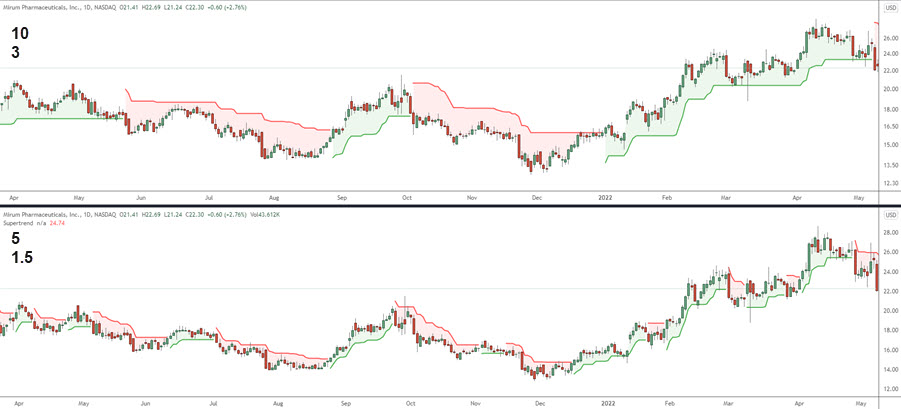
Due to the faster settings, the bottom chart will react quickly to changes in price, but can also lead traders into trades that are during periods of consolidation.
Also, there is no best time frame and your choice will depend on how much time you can devote to trading.
Proven Trading Strategies (2)Using Supertrend
This intraday trading strategy will use a combination of Supertrend indicators (2) and we will use settings that are different than the default for one of them.
- Short-term parameters of 10, 3
- Longer-term parameters of 30,9
- Initial stop loss via ATR|
You may want to change the color of one set of lines to avoid confusion. Let’s take a look at the strategy setup on the daily stock chart below.
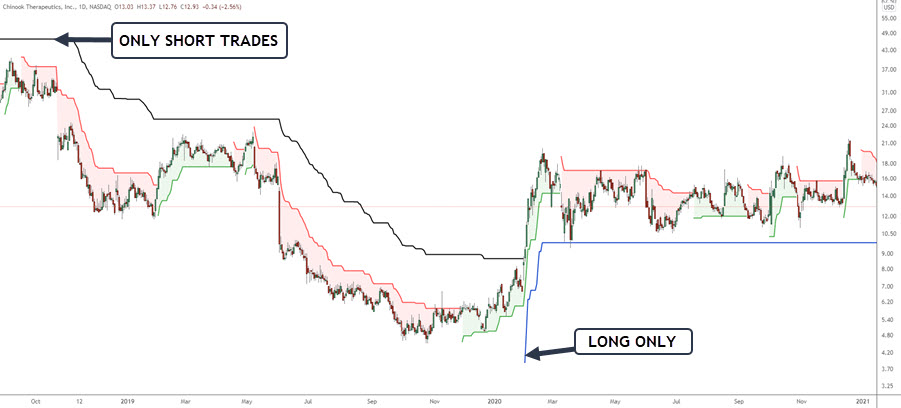
SuperTrend Trading Rules (Intraday)
| Aspect | Details |
|---|---|
| Main Principle | Trade in the direction of the longer-term trend |
| Signal Direction | – Black Supertrend: Short (Sell signals only) – Blue Supertrend: Long (Buy signals only) |
| Entry Condition | Short-term Supertrend flips in the direction of the longer-term trend |
| Initial Stop Loss | Set at the shorter-term indicator reading |
| Trailing Stop | Use short-term Supertrend line once price advances from entry |
| Profit Targets | Use risk multiples depending on chosen settings |
Day Trading With Supertrend Indicator
On the left, we are only allowed short trades as the longer-term Supertrend indicator is set to shorts only.
If the short-term indicator flips to green, we must ignore that setup using the basic strategy parameters.
Remember, our entry is a flip of the short-term indicator in the direction of the longer-term indicator. We do not enter on longer-term indicator flips.
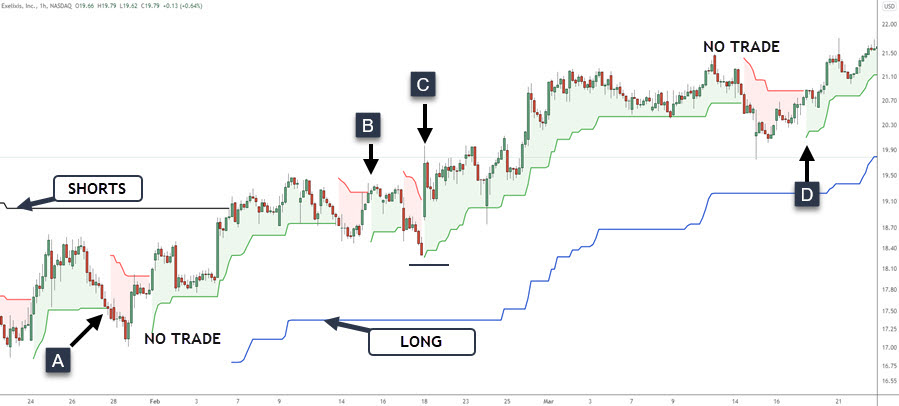
For our purposes in this example, we will use 1R targets to exit for profits. 1 R is simply taking whatever we risk ($3.00) and looking for 1 X that amount which is $3.00
The trade at A is stopped out for a loss.
We then get a flip to a long-trend direction and are looking for long trades. The trade at B is stopped while the trade at C runs for a full 1R winner. Finally, the trade at D also hits the 1R profit target.
Gaps
On occasions, the short-term trend may shift after a big price surge or an unusually strong candlestick. This can lead to losses that are significantly larger than usual, making it difficult to hit a 1R target.
It’s up to you whether you will accept the increased size of your stop loss, pass on this trade altogether, or wait for corrective action such as either a bull flag or a bear flag.
Positional Trading and Re-Entry
The same settings can be used for longer-term trading but we need to have the means to re-enter a trending market since they can run for a while.
We can use the pattern of a trending market to re-enter any trade that gets stopped without needing a flip in the indicator. This is an advanced trading technique that will require you to know the price structure.
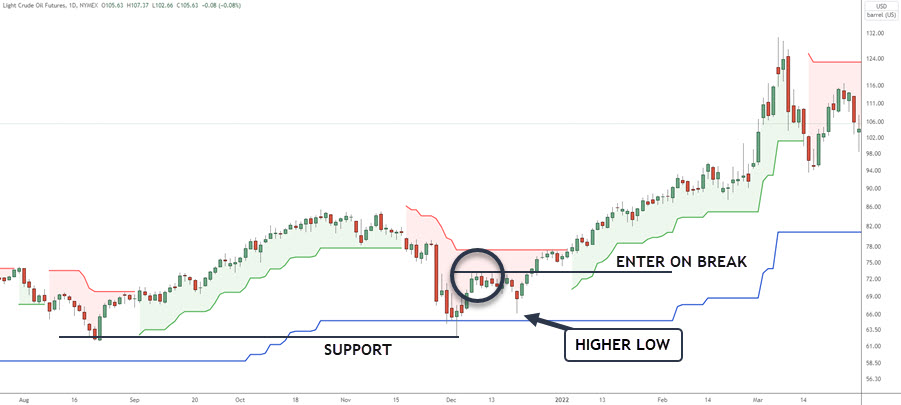
After a substantial climb, this daily chart of crude oil futures began to go through a series of corrections and the short-term indicator changed color to red. Crude oil pulled back into an area where it had previously found support before heading back to the upside.
Once the price has taken a slight pause, it begins to make a lower high but then stalls. After breaking through this swing level and making another higher low you can confidently say that there is trending price action occurring.
From here your new stop loss should be placed below any of those previous swing lows.
Depending on your current exposure, a trader may use the flip to green as a trading signal for another position in the market.
What’s The Best Indicator To Use With Supertrend Indicator?
One of the best indicators to use with a Supertrend indicator is MACD (Moving Average Convergence/Divergence). MACD uses exponential moving averages and helps to identify momentum in the instrument to help with buying/selling decisions.
One way to use the MACD in a Supertrend indicator strategy is to look for crosses to the upside in the MACD and a green line on the trend indicator. Momentum is up, the trend is up, and we have a buy signal. Look for a break of a resistance area for the trade entry.

In addition, other indicators to consider are the Stochastics and RSI (Relative Strength Index), which are both momentum indicators as well.
The Supertrend indicator works well with a variety of technical indicators and I would lean towards momentum indicators and take advantage of divergence on the chart.
Your Questions Answered
What settings do you recommend for swing trading?
A practical baseline is ATR=10, Multiplier=3. Adjust with volatility and test on your timeframe.
Does this work on futures or forex?
Yes. Same rules; widen stops in higher volatility and confirm with momentum (e.g., MACD/RSI).
Want momentum confirmation? Try our Best MACD settings or pair Supertrend with the 9 EMA strategy for cleaner entries.
How Does the Supertrend Indicator Perform During Market Gaps and Flash Crashes?
The Supertrend indicator may lag during sudden market gaps and flash crashes due to its reliance on previous price data.
During high market volatility, traders should exercise caution as the indicator might not instantly adapt to sharp price movements.
Trading psychology becomes crucial during these events, as emotional decision-making can lead to losses.
Using additional confirmation signals and maintaining strict stop-losses helps manage risks during extreme market conditions.
Can the Supertrend Indicator Be Effectively Used for Cryptocurrency Trading?
The Supertrend indicator can be effectively applied to cryptocurrency trading, particularly when adjusted for higher market volatility typical of crypto markets.
Traders often use wider ATR multipliers to account for crypto’s increased price swings. Supertrend strategies work well when combined with other technical indicators for confirmation, especially during trending periods.
However, due to crypto’s 24/7 trading nature, traders should monitor indicators more frequently and adjust parameters accordingly.
What Percentage of Professional Traders Rely on Supertrend as Primary Indicator?
While exact statistics on trader preferences regarding the Supertrend indicator are not officially documented, industry observations suggest that approximately 15-25% of professional traders use it as a primary indicator.
Most professionals typically combine Supertrend with other technical tools rather than relying on it exclusively. Its indicator effectiveness is generally viewed as complementary to a broader trading strategy rather than standalone.
Does the Supertrend Indicator Work Better in Specific Market Sectors?
The Supertrend indicator shows varying sector performance depending on market conditions.
It typically performs better in sectors with clear trending patterns, such as technology and consumer staples, rather than highly volatile or cyclical sectors.
However, indicator limitations exist, as it may generate false signals during choppy market conditions regardless of sector.
Success depends more on the overall market trend than specific sector characteristics.
How Often Should Traders Recalibrate Their Supertrend Parameters During Market Cycles?
Traders should review their Supertrend parameter adjustments quarterly, or when significant market volatility occurs.
Daily recalibration isn’t recommended as it can lead to confusion and overtrading.
Instead, traders should focus on monitoring market conditions and adjust settings only when there’s a clear shift in market behavior or trading timeframe.
Back-testing new parameters before implementation helps validate any changes made.
Original post date: Feb 2023
Updated: August 2025
16 Comments
Comments are closed.



How do I download the Supertrend indicator ? Looks good. Thanks :)
It depends on your trading platform.
I am a paid member. Do I get Suptertrend Indicator
It’s a freely available indicator not exclusive to Netpicks.
I’d like to download Supertrends but I have AOL as my main browser. I can get online using MicroSoft Edge or Firefox too. Can I use Supertrends on either of these?
Supertrend is an indicator that goes on your actual chart. It does not matter which browser you are using.
Dear Admin,
I trade MT5 most times. How do I download this indicator.
Thank you
Metatrader download links are in the article near the bottom
Where can I download the indicator, I do not see any links..
Thank you
It depends on your trading platform.
Hi, how Can I use this on Ninja or TOS?
Thanks
Yes. You just have to search for the custom-built indicator for those platforms.
what trading platform can you use with the Super trend indicator, and sense i’m red/green color blind can you use different colors?
The indicator package will depend on your trading platform. If you can code, you can make your own. Use google to search the indicator for your platform. Changing the color will depend on how it is coded.
Great explanation, thank you! :)
It is quite strange to read the comments, people can’t find it on TradingView? for free of course…
I am a Netpicks member and am using ThinkorSwij platform to trade. Where can I download the Supertrend Indicator for my platform?
Thanks,
Adam
Hey Adam. You can check this link: https://usethinkscript.com/threads/archived-supertrend-indicator-by-mobius-for-thinkorswim.12346/